my todo system
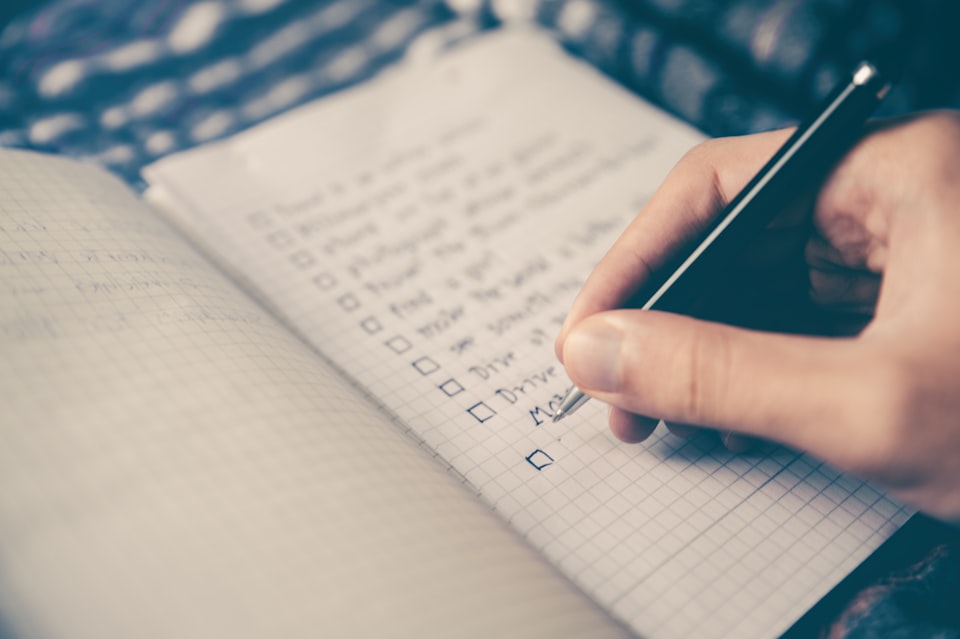
disclaimer: this is all WIP - I'll do a more tested version of this in the coming year
I've been working the last year on being organized and responsible, especially at work but also in my personal life. And I've cracked the code (at least for work).
Here's the system!
But first the main productivity concepts
- If you have the amount of tasks a PM does, you need some kind of system. I craved simplicity for a long time as a PM (how can I get a system going that doesn't require me to regularly process shit). And tried to eschew systems like GTD. But no, the work is complex, so the system to manage the work has to be somewhat complex. Personal life I can do without the system, but not work.
- Collect everything so you don't have open loops in your head about things you need to do. Once you have a trusted system, if you just file it in there, you can trust that it'll be picked up and worked on appropriately. It's really calming once you get to that state.
- Clean up tasks to be clear and actionable. To quote myself from another article: "It’s important to break down big nebulous todos into small well-defined todos—“next actions”, if you want to get all GTD about it. Compare the ill-defined task “Add multi day selection to scheduled reporting” to the concrete task “Add a migration to add a days field to the report schedule model”."
- Limit overwhelm by limiting your work in progress. Specifically, don't put a bazillion todos in "Today". Have only a few tasks in Today (your big rocks) and have a place you pull "bonus todos" from. This is key and tysm to this article
- Do daily reviews and weekly reviews. Realize this is the crux of the whole operation and keep trying to get this to work for you in your life. If you don't, the whole system falls apart. More on this later.
- Have checklists for your startup routine, shutdown routine, and weekly reviews. This way, you not only do you find yourself in a "mise en place" state, you get a dopamine rush from getting there. More on this later.
- Do look ahead to what's coming up in the week, not just what's coming up tomorrow. This results in less last minute work..
- Use "trigger" lists to make sure you don't forget any todos. For work, my projects are my triggers and this has helped me not forget about certain projects (which was a mistake I made in the past).
- Close Slack once in a while (yes even if you're a PM). For me, I'm always marked as away, but during business hours I use this emoji "Here". This is potentially controversial idk

- Time block your calendar when you can, otherwise you won't use time in between meetings well. Also use Focusmate if it works for you.
- Out of sight, out of mind. When you're done with work, close all your tabs and windows related to work. TRUST ME. Relatedly, if your Chrome has a bazillion tabs open, honestly just close the entire window. It's the easiest way to "clean them up".
- This is a collection of habits. You can't implement all of this at once, you'd get discouraged. Try one habit at a time. I can really recommend Zen to Done for people that find this overwhelming.
Software
I use Things for work and Todoist for my personal life. I like to keep it separate so I don't need to add a tag to separate work and personal todos. I prefer Things tbh.
I use Notion for my work journal.
When shit hits the fan
- First off, sometimes work gets crazy and/or life gets crazy.
- When that happens, don't ditch the todo list app altogether. Just use the "Today" view as a checklist for what you need to get done. h/t Mahesh for this concept! And also for recommending Things which changed my life
Filing & collecting tasks
- File tasks that pop into your head in the middle of the day into the Inbox.
- Things lets you add tasks with Ctrl Space anywhere on your computer. That makes it really easy. Todoist, I use the Chrome extension and the keyboard shortcut
qand it's almost there. - Also, file tasks during your daily and weekly reviews based off "triggers". For personal life, I keep a trigger list in Notion.
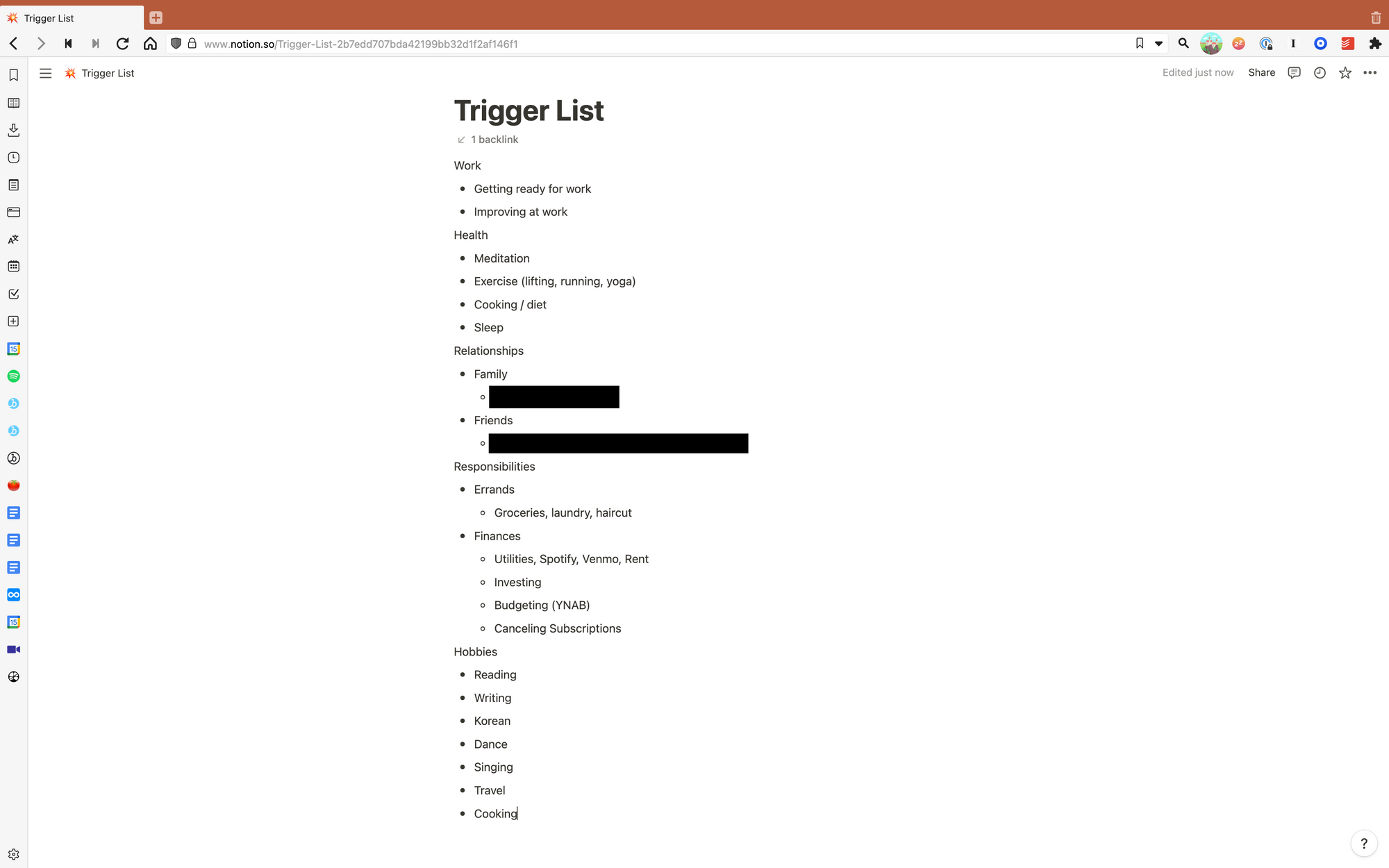
- For work, I look through my projects (features I'm working on), my meetings from the past day, and my meetings coming up for the next week. This helps me stay on top of projects.
Processing the tasks
When I do daily reviews and weekly reviews, I process what's in my Inbox the following way:
- I "clarify" them. To quote myself: "It’s important to break down big nebulous todos into small well-defined todos—“next actions”, if you want to get all GTD about it. Compare the ill-defined task “Add multi day selection to scheduled reporting” to the concrete task “Add a migration to add a days field to the report schedule model”."
- I put them into a project. For personal, my projects are General, Relationships, Health, Responsibilities, and Hobbies. For work, my projects are generally the features I'm working on, and occasionally ad hoc workstreams like OKR planning.
- I also put them into one of three buckets: Today, Anytime or Someday.
- Today is tasks for Today. Anytime is tasks I want to finish this week. I'll pull from Anytime if I run out of work for the day ("it's the place where bonus todos live"). Someday is for tasks that won't be getting done this week - a lot of tasks end up here. I'll also delete some tasks that don't even deserve to make it into Someday lol.
- Things has these categories out of the box. I worked around this in Todoist by creating filters for Anytime and Someday, backed by some labels.
Actually making time to process the tasks
- I took a year to actually do daily reviews/weekly reviews for my job, and honestly I wish I started a lot earlier. It's the crux of the whole operation
- One important note: It will feel really overwhelming to do daily or weekly reviews at first.
First, you're not used to staring down 30 todos and processing them. It can be slow and looks daunting. For years I procrastinated on them because of this. Over time you realize you just gotta do it. Take a deep breath and dive in.
Second, when you're first starting, you (1) don't have a clear process yet (2) don't have a great decision-making/prioritization muscle yet (3) you have hella todos to process since you're new to it all.
Hang in there. You got this. Keep trying until it becomes a habit. - Also I don't know why but having these recurring tasks with checklists in Things really helped me stick to my daily/weekly reviews. I also had them in Notion for a while and that works well too.
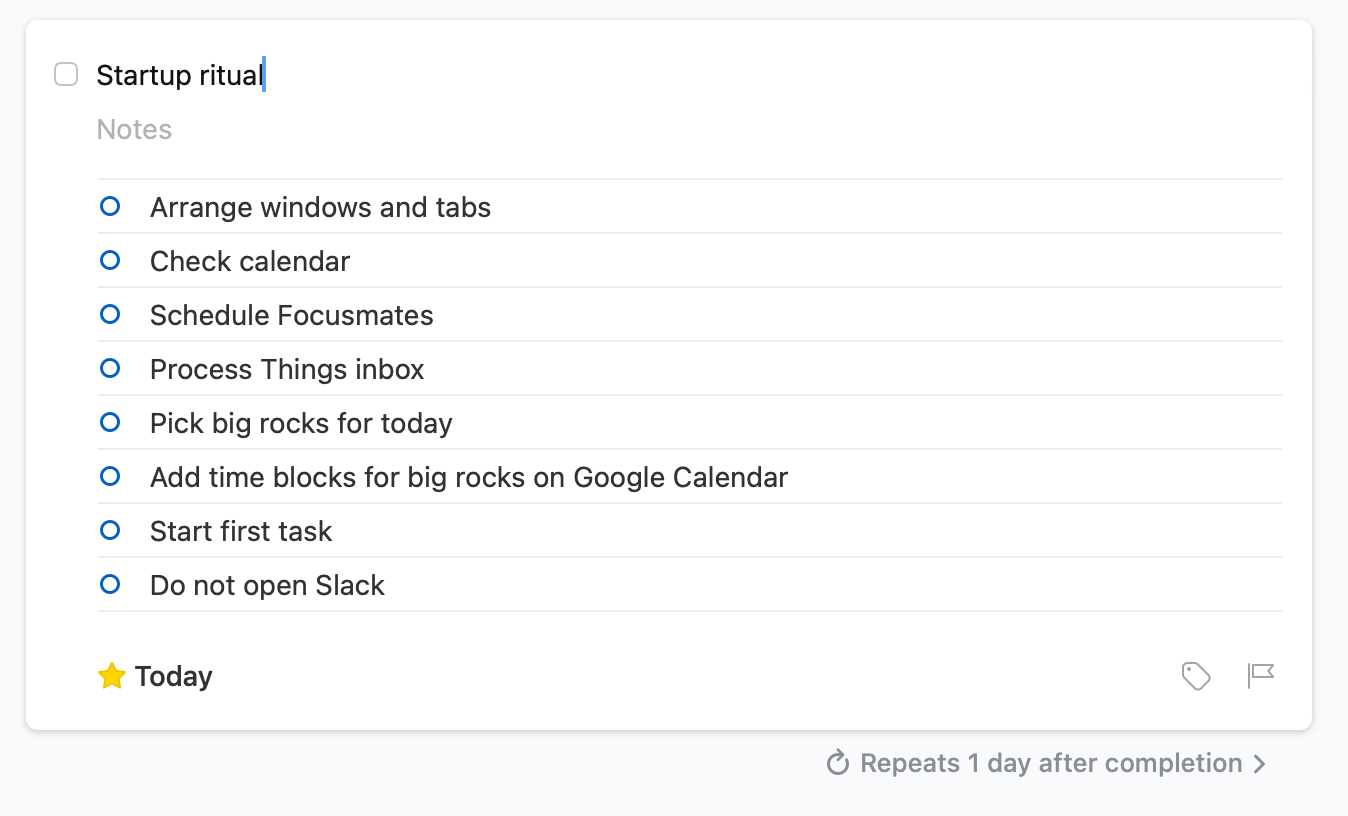
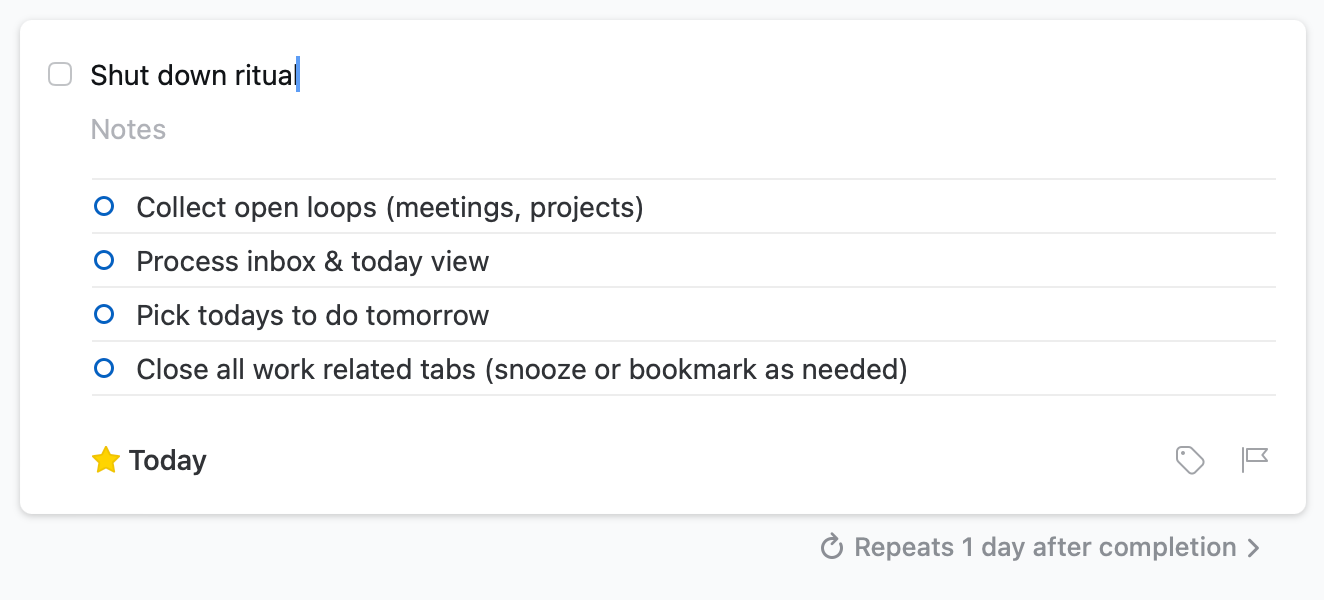
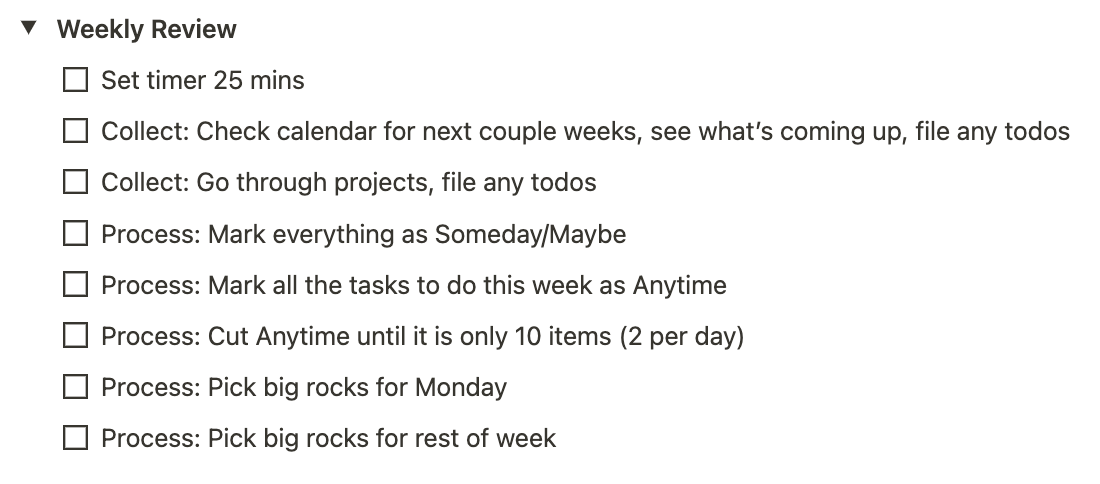
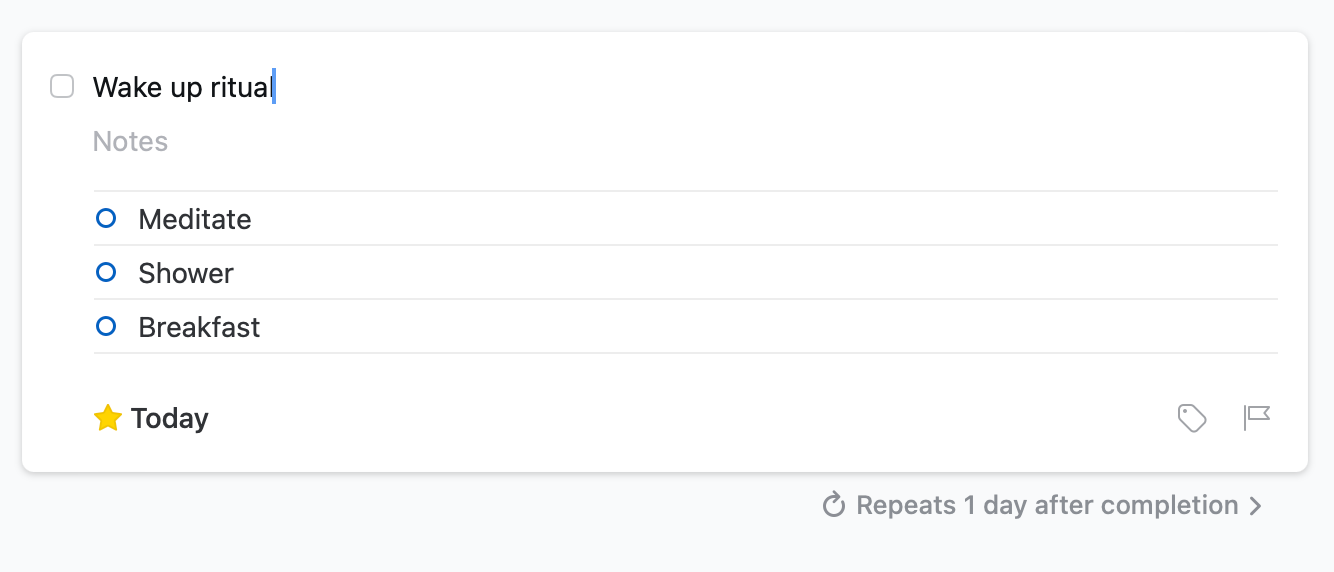
- I do a daily review for work at the beginning/end of the day, and weekly review for work on the weekends at a coffee shop. I want to move the weekly review to Friday afternoon, but alas, I struggle with motivation then...
- To clarify, I've been doing a weekly review for my personal life, but no daily review or even mid week review tbh. I'm trying to decide if this is something to be improved or not.
Actually doing the tasks
- Use Focusmate! It helps you have accountability to doing tasks, and it also helps you take breaks, which can help you focus again and actually be productive during that 3-5pm slot.
- Use a work journal and whenever you have a task where you're not sure about the next steps, just journal until you figure out the next steps. Similarly, if you're procrastinating on a task, journal until you figure out why you're procrastinating. I talk about my SWE work journal here.
Hopefully this is helpful to people <3 if not i had a lot of fun writing it lol. now time for bed
Member discussion